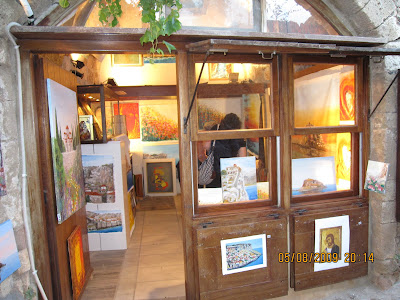The one thing that virtually every single book, play, movie, novel, and game has in common is that they all have at least one character. Most have 2 or more, and some—a cast of thousands! Sometimes the "character" is you.
Regardless of who the characters are, books and movies and all the rest would be lifeless and boring without them. So where do they come from, you may well wonder? We will show you that, and how to make your own!
Steps
Sample Character Description
Creating Your Own Fictional Character
1.) Define the scene. Whether on paper or on the screen, your character must exist somewhere, even if that somewhere is nothingness. It may be an apartment in Paris, or a parking lot in Poughkeepsie. This not only sets the stage for your character, it will help define them as well.
2.) Define your needs. If you're at the point of creating a character, chances are you have at least the idea of a story in mind.
• If you're creating a grand, sweeping narrative such as The Lord of the Rings, you will need an entire world of characters—some good, some evil, some male, some female...even some that are not good or evil or male or female.
• If you're creating an intimate story, you may not need more than a single character.
3.) Think creatively. Unlike what first comes to mind when you think "character," not every character in a story is animate. Using the novel Lord of the Rings as an example, the mountain Caradhras functions as a character, filled with a cold malice. In Hemmingway's The Old Man and the Sea," a marlin is one the main characters.
4.) Start with an archetype. Who you need depends on your story, of course, but by starting with broad criteria, you can start to make decisions that will gradually define your character by reduction, much like the sculptor removes all the excess marble, revealing the statue buried within it.
• Do you want a protagonist (hero) or antagonist (villain). Maybe you need a secondary character such as a henchman, a best friend, a romantic interest, a sidekick, or a significant other. Note that sometimes, what you think of as the protagonist—the good guy—is painted as the antagonist. For example, Kong in King Kong.
• You might need anti-heroes, like Clint Eastwood in Pale Rider; sympathetic "villains" such as Lennie Small in Of Mice and Men; wild cards like Jack Sparrow in Pirates of the Caribbean; a femme fatale like Jessica Rabbit in Who Framed Roger Rabbit; treacherous friends like Iago from Othello or Petyr Baelish in Game of Thrones; or perhaps a trickster guide like Smeagol in Lord of the Rings. Each of these began as archetypes, and their character then defined as the story was fleshed out.
5.) Add specific characteristics. Once you have your character's archetype defined, you can add traits and features, remove things the character isn't, and generally start to reveal the sculpture buried in the marble. Ask yourself what you want your audience to feel about your character: love, pity, revulsion, compassion—or nothing at all. Begin to draw your character based on your desired outcome.
• Determine whether the character is male or female. This will inform the character's general point of view, suggest traits depending on archetype, and may even be a point of conflict for your character and your story when seen through the eyes of society's preconceptions, whether fair or not. For example, an arrogant male is perceived differently than an arrogant female. (Both of which further define your character!)
• Age is a factor. Older is generally seen as wiser, but it comes into play in other ways as well. A young villain is generally portrayed and seen as a bad seed or simply insane. An old villain can all that, but might also be twisted that way by life's circumstances—giving him a lot more depth. The young, idealistic hero elicits a different feeling than the world-weary vet who is just doing the right thing. And when either of those meets their end in the story, the reactions are different as well.
• Sometimes these can be contradictory; Don Quixote was a crotchety old man who'd spent his life in a room reading chivalry novels, and was woefully naive. Yet it was this naivety that drove him to seek adventures and love, and to create fantastic imaginings from the world around him when reality didn't meet his expectations.
6.) Define your character's purpose or goal. In a horror tale, the protagonist may want to survive at all costs—for example, Ripley in Alien; in a romantic tale, the antagonist may want to stop the hero from getting his "true love," as did Prince Humperdinck in The Princess Bride.
• How your characters deal with the inevitable obstacles that stand between them and their aims will most clearly define them. In complex stories these might cross repreatedly, with the motivations and accomplishments of some characters getting in the way of others, generating further action and twists, and cumulatively raising the stakes.
7.) Give them attitude. To really flesh out a character, give them a personality that goes beyond the story itself. Some parts of their personality may never make it into your story, directly, but will help inform the decisions your characters may have to make.
• Make a list of likes and dislikes, and make sure the list is balanced. In other words, don't have 10 dislikes to every one like or vice versa. Even the crankiest characters like something, even if it's just their mirror.
• A character's attitude is likely made up of complementary traits, which can lead to actions that are unexpected and could change the audience's perception of your character. For example, the character that loves freedom is likely to dislike authority; if they like rich cakes or flashy cars, they're unlikely to respect frugality or restraint. If your character is merciless, but unexpectedly rescues a helpless child from a burning building, the audience is forced to rethink his character completely.
8.) Give your character quirks. Good habits, bad habits, or just things the character can't stop doing without some serious discipline or counseling. This can be minor, such as biting fingernails (which would indicate a worrier), or obsessive hair-combing (vanity or insecurity); or as serious as a drug addiction (somebody who evades responsibility and craves escape), or a death wish (hopeless and forlorn).
• The more of these little tics and traits you give your character, the more they will "come alive" in the audience's mind.
9.) Give your character a home—with a mirror. Work on external features such as where he lives, what she looks like and whether or not he has any pets, etc.
• Does your character live in a well-manicured Upper East Side apartment (old money), or a peeling-paint hovel in the district (a life lived hard)? Most details you choose should suggest something about the character, or the characters' history.
10.) Work out their fears, motivations, and biggest secrets. It creates a much more realistic character and helps to develop the character's archetype.
11.) Take mannerisms and features from people around you. Look at people at the mall, or on the subway. Suggestions for characters are everywhere.
• Note physical features—the shape of noses, jaws, ears, body shapes, how their clothes fit, or how they carry themselves.
• If you like their look, describe to yourself the details you find attractive, and translate that to your characters. If you see somebody that looks scary, honestly tell yourself why that person scares you, even if the reason is totally irrational or politically incorrect. Use this information to inform your characters.
12.) Associate symbolic archetypes. Matching your character's traits to our perception of objects can help define your character, and be useful for foreshadowing moods and actions. For example:
• A rose blooms briefly, but people adore them
• A snake is volatile and can strike without warning
• Stone buildings are solid and resistant to change
• Thunderstorms are violent, but presage a surge of growth to come
• A sharp sword is ever a danger to the hand that wields it.
Tips
• The type of character you create determines how the story will arc. If the main characters are closely aligned with their setting, the arc will begin shallowly, and the character will tend to blend in with their surroundings and the other characters around them. If they're diametrically opposed, dramatic conflict will unfold from the very beginning, and will have to work itself out from there.
• Remember: Don't give everything about the character away! Unless it's unlike them to keep something secret, make them a little mysterious. Give the readers something to read between the lines about. Just be careful not to make them too mysterious.
• Observe people around you; your Uncle Bob or Aunt Jane may end up in your next story. Or mix them up, and create an Uncle Jane.
• Physical appearance is of less importance for a believable character, try only for key details that illuminate their personalities).
• Or, alternatively to the above, take stereotypes and flip them on their heads.
o Example: Old librarian who acts shrill because she thinks she has to. In reality, she's actually the type who loves puppies and ice cream, and is the kind of lady you call "Grandma" even though you aren't related.
• While it's not necessary to work on the steps in precise order, you may find it's a lot easier to develop the personality of a character before you figure out what they look like
• Remember: This process is intended to give you a character that's more or less a real person. If necessary, add or remove steps to get this sort of character.
• If you are having trouble coming up with supporting characters, use stereotypes and boost them up.
o Example: Old librarian that became bitter when her husband abused her. She constantly lives in fear that he will someday find her.
• When people tell you interesting stories, listen! Fiction or nonfiction. Who knows? You might get a perfect character from your dad's ex-girlfriend's daughter who killed her abusive husband!
• If you are creating a character that is a animal, let's say, a cat -- do the same things you would for a human character. Describe the cat's looks, likes and dislikes, and such. Here is an example: The small black cat, Shadow, happily rides around with a girl named crystal. Shadow, a tom, has sparkling, yellow-green eyes and long, silky black fur, with white "socks" and white-tipped tail.
Warnings
• Be careful when observing those around you. If you base a character too much upon someone, you may get into legal trouble. So, remember this simple rule: Do not add a real person, dead or alive, unless you have permission to do so.
Things You'll Need
• Anything to write with. Pen, paper, computer, or even a typewriter or tape recorder you can talk into.
• While not necessary, a subscription to a writer's magazine can further enhance your writing skills. Seriously, it really can.






























